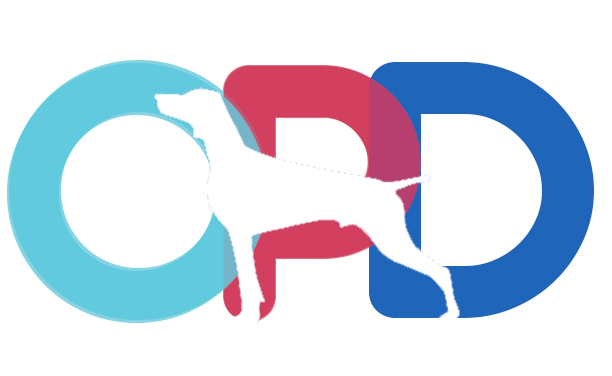by Karen
(Missouri)
Mackenzie is our 75 lb, 13 ½ year old black lab mix, whom we thought was healthy for the most part, but was diagnosed in April 2013 with Cushings Disease. She has always been an extremely anxious dog, but recently, when our other dogs (maltese) were diagnosed with yeast infections, we realized that that Mackenzie has probably had yeast overgrowth (smelling like corn chips, licking paws, shaking head, etc.) for years, and because of our lack of knowledge, has suffered while we thought she was just anxious and had “dry skin”……
When Mackenzie was first diagnosed with Cushings, the vet offered medications that I did not feel comfortable with –or they were extremely expensive. I turned to using essential oils, and have had incredible success in eliminating all of the previous symptoms (GERD/reflux, hind leg weakness, excessively drinking water) up to this point. During the last 3 months, however, her appetite has increased, and the reflux has returned. We started giving her a “snack” of her dry food before bed, which seemed to help the morning reflux, until now……
The evening of January 10, before bed, Mackenzie barked for her “additional” treat, but kept barking for more food. I ended up giving her 2 more helpings, and she continued to bark for more, but I refused to give it to her, thinking that it may cause more harm.
The next morning, she did not get out of bed. Finally, that afternoon, I remembered we had Famotodine for her for GERD, so around 3 p.m., we gave her a pill with cheese, and within an hour, she came down to go outside . She went to the bathroom, drank some water, but would not eat. She did eat some natural chicken jerky treats, but that was it for the day. I also noticed that her breath had an odor similar to urine – or ammonia – so I did research and found that this may be a sign of kidney problems. This strong odor lasted a day – and then seemed to get a little better.
Years ago, she had an episode where she vomited bile, and our vet told us that this was linked to eating a high-protein dog food which could cause kidney problems. We switched to another “lower protein” commercial food (unfortunately) – but she got better. Recently, we have tried to go grain-free, but everything gave such horrible gas, and she was always barking/crying as if she didn’t feel good, so we stopped trying. Back then, we would have never thought that dogfood could cause such problems….
Because of the yeast epidemic we had with the maltese, I started giving all the dogs some soil-based probiotics (human grade), about a week before this happened, and all were doing much better, including Mackenzie – until now. I gave her one probiotic 2x/day for 3 days, since we now realize she has had a yeast problem for quite some time. We started mixing the grain-free food with her regular food, which she was beginning to tolerate without the gas.
Up until this episode, she ate processed canned and dry food (which we want to ween her from) and a homemade “gravy” for the dry food which consists of human grade ground turkey, chicken broth, chopped spinach, coconut flour and water.
Looking back this past year, especially after this incident, we suspect some of Mackenzie’s behaviors were probably indicating that she wasn’t feeling good. She often appears to “bark for no reason” for long periods of time, and will often go to the back door and bark as if she wants to go out, but when the door is open, she sniffs, and refuses to go out. Then, within 2-3 minutes, she will bark to go out – and does. She’s also started whining more, which we thought was a “behavior” used so she could come into the den to eat the other dogs’ food. We realize now (with much sadness) that she was probably trying to tell us she was feeling bad – and this was her way of telling us…..
For the past few days, she has been drinking approximately 3-4 ounces, 2-3x a day. She is eating some canned food from our vet for digestive issues, and also another “natural” canned food we found (with limited “fillers”) – so it is better than the processed food we were giving her, but nonetheless, I know it’s not the best for her either. She either gags –or turns her head – at the smell of any other food, so we have started giving her the Famotodine with cheese again.
The last two days, Mackenzie has avoided the dry food. If she accidentally ate a dry kernel, it was almost as if she were “smacking” her food (similar to a child “smacking” bubble gum) – and then, after she swallowed, she made this “clicking” sound with her teeth. I looked into her mouth (as best I could), and noticed it looked red and inflamed in several places. I used a drop of essential oils diluted with almond oil on a Q-tip and swabbed the inside of her mouth, and continued using the other oils to treat her Cushings and now the possible kidney failure.
Right now, she is lethargic – and has episodes of panting (especially after going upstairs) – and is very weak. For instance, she does not bark when she wants to come in from outside, and when the door opens, she is extremely delayed when trying to start up the step to come in. She is also more anxious – appearing very nervous to pass through certain walkways and doors, as if something were going to jump out at her.
Yesterday, we took her to our vet, and he could not give us any answer. He gave a round of antibiotics – even though she did not have a fever – but we did not feel comfortable giving them, not knowing what was wrong with her.
Tonight, I checked the stools in the yard and found two separate areas that had pitch-black stools, which were significantly different from other stools nearby. They appear to have been there less than 24 hours. It was dark, so I am not sure if there were other ones, too. Fortunately, she has not lost much weight – maybe 3-4 pounds since her last vet appointment – which has been in the last 6-8 months.
I have so many questions – but don’t know what exactly to ask, other than “what can I do to save her?”
1. What foods can I make (on a limited budget) that will not interfere with her Cushing’s as well as this most recent (kidney?) problem – and how can I get her to tolerate these new foods (natural, grain-free) without upsetting her digestive system even more?
2. What are other “signs” of discomfort or pain – other than whining, pacing, panting, or seeing her belch (reflux)? I believe that she may have a certain “bark” for pain as well – is that true?
I realize her condition will never be “cured” – but if we can improve her quality of life without making her more miserable in the process, that is what we want.
I pray that you can give us what we need to help her…… Like so many others, she is our “baby”….. We thank you in advance, and eagerly look forward to your response…..
Sincerely,
Karen
Comments for Dog Breath Smells Like Ammonia / Urine | ||
| ||
| ||
Click here to go back to the Ask a Vet Online Library of questions.
Do you believe in holistic pet care? If so, please tell your friends about us. Thank you for supporting our efforts!
Also see…
- Back to Dog Health Problems Symptoms / Dog Illness Signs Symptoms / Natural Dog Remedies
- Back to 10 Best Dog Food Options / Dog Food Ratings / Buy Dog Food Online
- Back to Conventional vs. Holistic Veterinarians
- Back to Organic Dog Supplies Online
- Back to Pet Friendly Airlines / Pet Friendly Travel
- Back to Organic Pet Digest Natural Dog Care Home Page

